Interview with Brent Goerz, Owner of Simple Pine Boxes
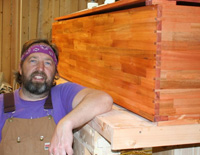 When it comes to memorial services, I've noticed a tendency to complicate things. It's as if our grief is measured by glitz. So when I came across Brent Goerz's site Simple Pine Boxes, I was moved by the beauty of its simple message. Brent's philosophy is affordability, sustainability, and above all, family participation. He believes that when funeral industries took over the work of burial, they also deprived men of processing their grief. For DIY coffins, completed coffins, urns, and other simple boxes for everyday use, please visit Brent's site and blog.
When it comes to memorial services, I've noticed a tendency to complicate things. It's as if our grief is measured by glitz. So when I came across Brent Goerz's site Simple Pine Boxes, I was moved by the beauty of its simple message. Brent's philosophy is affordability, sustainability, and above all, family participation. He believes that when funeral industries took over the work of burial, they also deprived men of processing their grief. For DIY coffins, completed coffins, urns, and other simple boxes for everyday use, please visit Brent's site and blog.
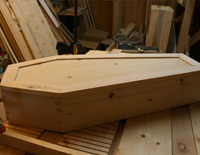
Why the name "Simple Pine Boxes"?
I am the son/grandson of a Mennonite farmer who was taught to call a spade a spade. For that reason, I refer to them as boxes because that is what they are. I started asking people several years ago what type of box they would like when they leave this earthly realm. I have asked over one thousand people this question, and only one stated they wanted an expensive hardwood box. Most say they don't care, but most said all they want is a simple pine box
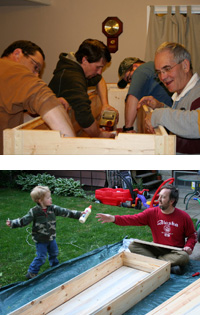 How can men benefit from building the coffin?
How can men benefit from building the coffin?
Men traditionally grieve instrumentally, which means they don't use their head and mouth - they use their hands. Many people are curious why so many men grieve in dysfunctional ways (isolate themselves, abuse substances, etc.) I believe it's because we have left them with nothing to do. Women have been very astute and insightful by maintaining their responsibilities. If you give a guy a task to complete in the hours/days leading up to a funeral, they will jump at the opportunity. We used to think this distracted them from the uncomfortable feelings inside of them. However, what we have now understood is that men are actively engaged in processing their thoughts and emotions while keeping their hands busy on a task that relates directly to their loss. This is called “participatory grief”.
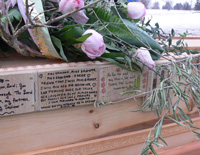 How can building a box bring a family together?
How can building a box bring a family together?
When my grandmother died I was asked by my mom to build her box. I knew it was an honor and treasured the responsibility. As I was finishing the box a few days later, I started to stress out with the finishing details. After stressing for several hours, I finally realized that it wasn't mine to finish. I called my mom up, put the box on the roof rack of our van, and drove three hours to my parents' house, where the entire extended family finished the box in the basement of the home. We had three generations of family working on it, from the four year-old great grandchild filling nail holes with a putty crayon, to my uncles who sanded and fussed over all the small details. I then asked all 26 grandchildren to each decorate a 4x6" plaque that was mounted on the box. This allowed maximum participation from all parts of the family.
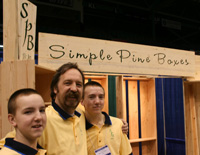 Most people assume they have no choice but to hand over their loved ones to a funeral home. Is this true?
Most people assume they have no choice but to hand over their loved ones to a funeral home. Is this true?
In most states and all provinces it is possible to take a much more hands-on approach to taking care of our dead. The home funeral movement is trying to change the law in the last states where legislation forbids the family from participating in the process. The hospice movement has encouraged people to be cared for at home, however once death occurs we call the professionals. I have heard of numerous stories where the dead were cared for at home, transported by loved ones and planted (or cremated) in the presence of their community. My grandmother was transported 800 km over a provincial boundary by her youngest son. Some of their friends thought that were morbid, but my aunt replied that grandmother was around family all her life, it only made sense that the last road trip was made with a family member.
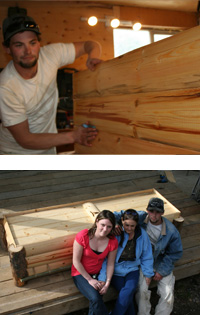 Yours is a family business, which seems appropriate considering your philosophy. Through this work, what have you discovered about your sons, and yourself as a father?
Yours is a family business, which seems appropriate considering your philosophy. Through this work, what have you discovered about your sons, and yourself as a father?
I am very blunt with my family about death being part of life. I now recognize that every day of life is a gift and there are no guarantees. My kids have had the opportunity of sharing this honest dialogue about an event that everyone will face one day. I hope that this openness will enable my children to embrace this reality sooner once I take my last breath. This spring my two youngest had the opportunity to see a family come together and finish a box for their loved one. (see www.owensbox.blogspot.com for more information.) The death of this individual was horrific and intensely tragic but my boys were able to see a family begin the rebuilding process in the finishing of their loved one's box.
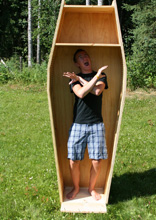 How do you imagine your own funeral?
How do you imagine your own funeral?
I have had the opportunity of going on motorcycle trips with three of my four sons on separate trips. We have gone in different directions, from Alaska, Vancouver Island, and the Oregon coast. My last son and I will head east. I think it would be a huge gift to ask them to scatter parts of my ashes somewhere along this journey. The advantage of cremation is that it allows time to pass, and once someone emerges from the acute grief stage, you can present them with the idea of a road trip in which the final goal is to let go of their loved one. This is symbolically significant, but in practice it encourages active processing of grief. I am sure that in a few years I will come up with other ideas.







